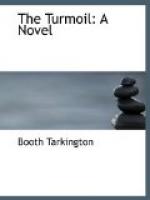“Dust to dust,” said the minister, under the gaunt trees; and at that Sheridan shook convulsively from head to foot. All of the black group shivered, except Bibbs, when it came to “Dust to dust.” Bibbs stood passive, for he was the only one of them who had known that thought as a familiar neighbor; he had been close upon dust himself for a long, long time, and even now he could prophesy no protracted separation between himself and dust. The machine-shop had brought him very close, and if he had to go back it would probably bring him closer still; so close—as Dr. Gurney predicted—that no one would be able to tell the difference between dust and himself. And Sheridan, if Bibbs read him truly, would be all the more determined to “make a man” of him, now that there was a man less in the family. To Bibbs’s knowledge, no one and nothing had ever prevented his father from carrying through his plans, once he had determined upon them; and Sheridan was incapable of believing that any plan of his would not work out according to his calculations. His nature unfitted him to accept failure. He had the gift of terrible persistence, and with unflecked confidence that his way was the only way he would hold to that way of “making a man” of Bibbs, who understood very well, in his passive and impersonal fashion, that it was a way which might make, not a man, but dust of him. But he had no shudder for the thought.
He had no shudder for that thought or for any other thought. The truth about Bibbs was in the poem which Edith had adopted: he had so thoroughly formed the over-sensitive habit of hiding his feelings that no doubt he had forgotten—by this time—where he had put some of them, especially those which concerned himself. But he had not hidden his feelings about his father where they could not be found. He was strange to his father, but his father was not strange to him. He knew that Sheridan’s plans were conceived in the stubborn belief that they would bring about a good thing for Bibbs himself; and whatever the result was to be, the son had no bitterness. Far otherwise, for as he looked at the big, woeful figure, shaking and tortured, an almost unbearable pity laid hands upon Bibbs’s throat. Roscoe stood blinking, his lip quivering; Edith wept audibly; Mrs. Sheridan leaned in half collapse against her husband; but Bibbs knew that his father was the one who cared.
It was over. Men in overalls stepped forward with their shovels, and Bibbs nodded quickly to Roscoe, making a slight gesture toward the line of waiting carriages. Roscoe understood—Bibbs would stay and see the grave filled; the rest were to go. The groups began to move away over the turf; wheels creaked on the graveled drive; and one by one the carriages filled and departed, the horses setting off at a walk. Bibbs gazed steadfastly at the workmen; he knew that his father kept looking back as he went toward the carriage, and that was a thing he did not want to see. But after a little while there were no sounds of wheels or hoofs on the gravel, and Bibbs, glancing up, saw that every one had gone. A coupe had been left for him, the driver dozing patiently.




